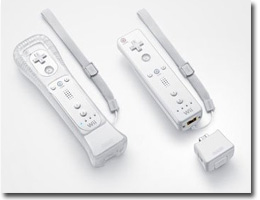Wii Motion Plus is Nintendo’s next big hardware up sell, an add-on that should make the Wii controller more realistic and flexible when playing highly sensitive “real movement” games. The hardware has been looked at by many in the industry as fixing imperfections in the current hardware, a patch of sorts.
 The Wii Motion Plus is going to be bundled with Wii Sports Resort, a title that’s obviously playing off the biggest Wii hit Wii Sports. Latest reports are showing the game title missing from the upcoming release lists, so, it’s not too far fetched to assume the hardware will be delayed along with the game, considering this was the first game to rely on the Wii Motion Plus hardware.
The Wii Motion Plus is going to be bundled with Wii Sports Resort, a title that’s obviously playing off the biggest Wii hit Wii Sports. Latest reports are showing the game title missing from the upcoming release lists, so, it’s not too far fetched to assume the hardware will be delayed along with the game, considering this was the first game to rely on the Wii Motion Plus hardware.
The delay is rumored to be due to a few problems with the Wii Motion Plus, more than likely during the final stages of testing the prototype products. In Nintendo’s defense, they’re usually very good about due diligence when it comes to producing hardware and software, taking the time that is needed to get something into the customers hands that’s acceptable quality. All eyes are on Nintendo with the Wii Motion Plus because people see this as the final “fix” to make the Wii controller do everything it was promised to do.
While Nintendo doesn’t see the original controller as broken (nor do the millions of customers buying them everyday), this new hardware should make it more sensitive for games that require perfect movement… games like Wii Sports Resort?
At this point we’d expect to hear news of a slight delay by Nintendo soon. We’d rather see it arrive late than utterly broken and useless.
(Thanks, Kotaku)

 A lot of people have purchased the Xbox 360 and a growing number have had new interests in the PlayStation 3. The summer time is winding to an end and fall will bring us a new host of video games and reasons to keep playing our current generation consoles. Many analysts and industry leaders believe the 360 and PlayStation 3 will
A lot of people have purchased the Xbox 360 and a growing number have had new interests in the PlayStation 3. The summer time is winding to an end and fall will bring us a new host of video games and reasons to keep playing our current generation consoles. Many analysts and industry leaders believe the 360 and PlayStation 3 will
Third party developers are probably happy about this.
Third party developers are probably happy about this.